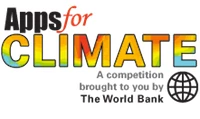
For those who have been watching the competition and wondering what developers might cook up, now comes the fun part: trying out the dozens of interesting apps and voting for your favorites. Voting for the Popular Choice category is now open and runs through April 27, 2012, with the winner receiving US$5,000. The entry pool contains something for everyone, including web apps, mobile apps, visualization programs, and games. Some apps focus on taking actions to reduce greenhouse gas emissions and others on different aspects of development and adaptation.
Formal judging also kicks off this month. The judging panel includes Christiana Figueres, Rachel Kyte, Rajendra Pachauri, Juliana Rotich, Andrew Steer, and Patrick Svenburg. This group will be reviewing the qualifying entries, and making awards based on originality, design, performance, and potential impact. We will announce these awards in June. There are 15 awards in all, with the first place winner receiving US$15,000.
Awards are just the beginning. The World Bank launched the Open Climate Data Initiative with the goal of making essential climate and climate-related data more readily available. So in addition to recognizing the best ideas in the competition, we are interested in hearing everyone’s ideas on improving the quality and availability of climate data. For developers who entered the competition: which data sets did you find most useful, and which were hard to use or understand? What kinds of data do you wish were available but could not find at all? Which data sets could be improved? Do you have future plans for the apps you submitted?
For development practitioners, analysts, academics, and policymakers: what do you wish were available in terms of data or tools? What can be done to improve data collection, methodologies, and understanding about climate adaptation and development? What would be a “killer app” for climate?
We hope that Apps For Climate is just the start of a longer dialogue. Follow us on Twitter or join the discussion forum to add your voice to the conversation. And don’t forget to vote for your favorite climate apps by April 27th.


Join the Conversation